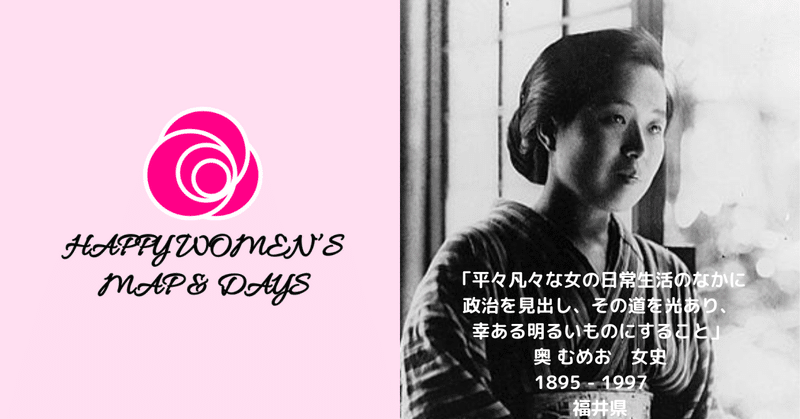
Happy Women's Map 福井県 大衆的な婦人参政権運動の先駆け 奥 むめお 女史

奥 むめお 女史
Ms. Mumeo Oku
1895 - 1997
福井県福井市 生誕
Born in Fukui-city, Fukui-ken
「平々凡々な女の日常生活のなかに政治を見出し、その道を光あり、幸ある明るいものにすること」
“Find politics in the ordinary life of women, and make their path bright, happy and bright.”
奥むめお女史は子連れ婦人運動家の草分けです。「賃金奴隷」「家庭奴隷」である女性の解放を目指し、戦前から一貫して生活を政治に結びつける運動を繰り広げました。
Ms. Oku Mumeo was a pioneering figure among activist mothers. She consistently pursued the liberation of women labeled as "wage slaves" and "domestic slaves," and from pre-war times onward, she engaged in movements that intertwined livelihood with politics.
*******
むめおは福井県福井市の鍛冶屋の長女として生まれます。低賃金と長時間労働で苦しむ機織り工場で働く女工たちがあふれるなかでも、むめおは教育熱心な父のもと『青鞜』創刊号はじめたくさんの本を与えられ、福井師範附属小学校、県立高等女学校、日本女子大学校へ進学します。母は封建的な家族制度のもとで忍従しながら生きた日本の伝統的な母親で学問が無くとも家業を助け、使用人の世話をし、7人の子どもを産んで33歳の若さで早世します。むめおも幼少期から朝暗いうちから夜遅くまで使用人とともに家事労働に従事します。女子大では図書館で哲学書を読みふけり、寮生活で料理の腕を上げて先輩小橋三四子の『婦人週報』の料理記事担当として手伝います。卒業後、鎌倉で豪農の娘の家庭教師の仕事に就きながらお寺で参禅体験三昧。東京へ戻ったむめおは、無政府主義や労働問題、哲学や人芸術論などの学習会に参加、『労働世界』の記者として富士瓦斯紡績工場への潜入取材レポートを発表、「賃金奴隷」である労働・職業婦人の解放を訴えはじめます。24歳で詩人・奥栄一と結婚。翌年、同窓生である平塚らいてう、市川房枝、坂本真琴らと婦人団体・新婦人協会を設立。平塚と市川が運動から離れた後も、機関誌『女性同盟』の編集を引き継ぎ、子連れで国会議員に対する請願運動を継続。男子同様女子が政治集会に参加する自由と権利、ならびに花柳病男子は全治するまで結婚を禁止する法律を実現します。
離婚をして母子家庭となったむめおは「家庭奴隷」である無産家庭婦の開放を目指し、消費生活協同組合の新居格や産業組合の千石興太郎から消費組合運動などについて学びます。28歳のとき職業婦人社をあらたに旗揚げ、雑誌『職業婦人』(後に『婦人と労働』『婦人運動』と改題)を発刊。女性が自由に社会活動また社会形成に参画できるように、家庭生活・消費生活の合理化・共同化のための最新情報をかみ砕いて紹介します。都市中間層の中産階級から地方の一般無産階級の女性まで、女性運動の羅針盤また購読者同士の交流のよりどころになります。ならびに婦人消責組合協会を立ち上げ、今まで婦人運動でなおざりにされてきた家庭婦人の日常の問題、物価値下げ、不正商品の摘発、児童福祉、母性保護、学校教育の改善、税制改革、社会的福利施設の増設などの解決を目指します。さらに託児所兼集会所『婦人セツルメント』(後の『働く婦人の家』)を全国展開。託児保育、こどもの健康指導、婦人の性教育・妊娠調節・授産指導、夜間女学部での家政はじめ学問また芸術講義、資格・職業斡旋、物資の共同購入、共同炊事・洗濯、懇親会、少年少女会、などの活動を社会事業として展開、勤労婦人たちの連帯と憩いと社会学習の「家」となります。52歳で第1回参議院議員通常選挙に出馬・当選、消費者のための省庁・「生活省」の設置を目指して3期18年務めます。議員活動の傍ら新団体・主婦連合会の会長に就任、エプロン(割烹着)としゃもじを旗印に、不良品追放や『主婦の店』選定運動を全国展開。消費者・婦人運動を終生指導し続けます。
"Mumeo was born as the eldest daughter of a blacksmith in Fukui City, Fukui Prefecture. Amidst a sea of female workers struggling with low wages and long hours in weaving factories, Mumeo was fortunate to have an education-driven father who provided her with numerous books, including the inaugural issue of 'Seikō.' She progressed through Fukui Normal Elementary School, Prefectural High School for Girls, and Japan Women's University. Her mother, a traditional Japanese mother, lived under a feudal family system, devoid of formal education. Despite this, she supported the family business, tended to domestic duties, took care of servants, and gave birth to seven children before passing away at the young age of 33. From a young age, Gummo assisted with household chores alongside servants, working from early morning until late at night. During her time at women's university, she immersed herself in philosophical texts at the library and honed her cooking skills in the dormitory. She also assisted senior Kohashi Misako with cooking articles for 'Fujin Shūhō' ('Women's Weekly'). After graduation, Gummo worked as a private tutor for a wealthy farmer's daughter in Kamakura, while also immersing herself in Zen meditation at a temple. Upon returning to Tokyo, she participated in study groups on anarchism, labor issues, philosophy, and human arts, eventually becoming a journalist for 'Rōdō Sekai' ('Labor World'). She published investigative reports on Fuji Gas Spinning Factory, advocating for the liberation of laboring and professional women, often referred to as 'wage slaves.' At 24, she married poet Oku Eiichi. The following year, along with her classmates Hiratsuka Raichō, Ichikawa Fusae, and Sakamoto Makoto, she established the women's group 'Shin Fujin Kyōkai' ('New Women's Association'). After Hiratsuka and Ichikawa stepped back from the movement, Mumeo took over as the editor of the magazine 'Josei Dōmei' ('Women's Alliance') and continued campaigns, including petitions to parliament with her children in tow. She successfully fought for women's right to participate in political gatherings and achieved a law preventing marriage until a man had fully recovered from venereal diseases.
Having gone through a divorce and become a single mother, Mumeo aimed to liberate proletarian housewives, often referred to as 'home slaves.' She learned about consumer cooperatives and other movements from leaders like Aratake Kōtarō and Niitsu Atsuko. At 28, she founded the 'Shokugyō Fujin Sha' ('Occupational Women's Association') and launched the magazine 'Shokugyō Fujin' ('Occupational Women'). With the goal of enabling women to participate freely in societal activities and formation, she introduced accessible information about rationalizing and communalizing domestic and consumer life. Her work spanned from middle-class urban women to working-class rural women, serving as a compass for the women's movement and fostering connections among subscribers. She also established the 'Fujin Shōseki Kumiai Kyōkai' ('Women's Publishing Cooperative Association') and tackled everyday issues faced by housewives that had been overlooked, including price reductions, exposing fraudulent products, child welfare, maternal protection, educational improvements, tax reforms, and increasing social welfare facilities. She further expanded the nationwide network of 'Fujin Settorumento' ('Women's Settlement'), which included daycare, children's health guidance, women's sexual education, guidance for pregnancy management and childbirth, evening courses in home economics and various arts, vocational training and matchmaking, collaborative purchasing of goods, communal cooking and laundry, social gatherings, and activities for young boys and girls. These initiatives were developed as part of social business. At 52, she ran for and won the first regular election of the House of Councillors, serving for 3 terms and 18 years. Alongside her parliamentary activities, she became the president of the new organization 'Shufu Rengōkai' ('Housewives' Association'), symbolized by an apron and a rice paddle, and spearheaded a national campaign to ban defective products and endorse 'Shufu no Mise' ('Housewife's Shop'). She continued to lead consumer and women's movements throughout her life."
-主婦連合会 Association of Consumer Organizations

Share Your Love and Happy Women's Story!
あなたを元気にする女性の逸話をお寄せください!
Share your story of a woman that inspires you!
この記事が気に入ったらサポートをしてみませんか?
